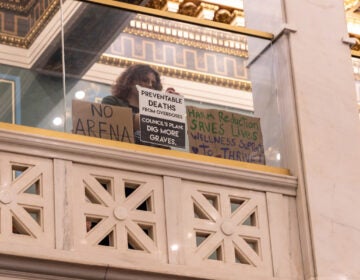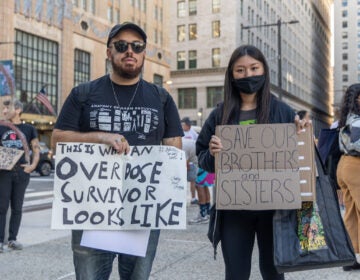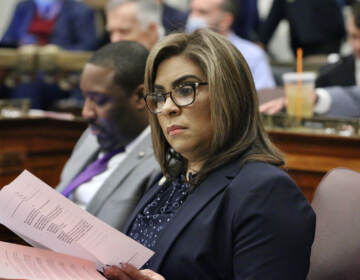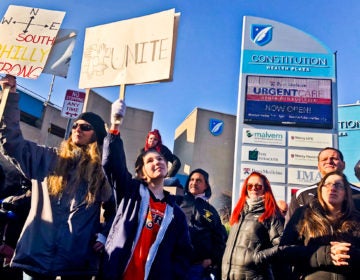Safehouse fights to keep supervised consumption site case alive in Philly as DOJ seeks dismissal
The latest development comes after more than a year and a half of failed settlement negotiations in the federal civil case.
Listen 1:13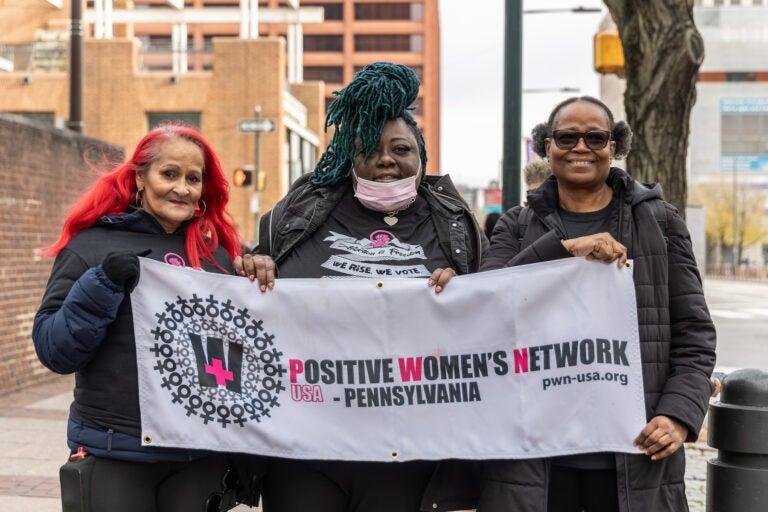
Maria Cookie Cruz (left), Kenya Moussa (center) co-chairs of PWN Pennsylvania, with Jeanette Murdock a PWN member who canvassed for overdose prevention centers in Philadelphia, outside the federal courthouse in Philadelphia on December 4, 2023. (Kimberly Paynter/WHYY)
From Philly and the Pa. suburbs to South Jersey and Delaware, what would you like WHYY News to cover? Let us know!
Philadelphia nonprofit Safehouse and the U.S. Department of Justice returned to court Monday after more than a year and a half of failed settlement negotiations regarding the legality of supervised consumption sites, also called overdose prevention centers.
Religious freedom under the First Amendment is at the center of Safehouse’s case for the right to open and operate a facility where people can bring and use drugs under the supervision of experts, who can intervene and prevent fatal overdoses.
In the U.S. District Court for the Eastern District of Pennsylvania, lead Safehouse attorney Ilana H. Eisenstein objected to the DOJ’s request for the case to be dismissed by arguing that the nonprofit’s proposal is constitutionally protected.
“We’re hoping to continue to prove the sincere motivation of our board members, out of an exercise of faith, to save lives and provide shelter and critical care to people suffering from addiction and who are at risk of overdose,” Eisenstein said. “We look forward to proving that the government does not have a compelling interest – that’s the standard – in stopping us.”
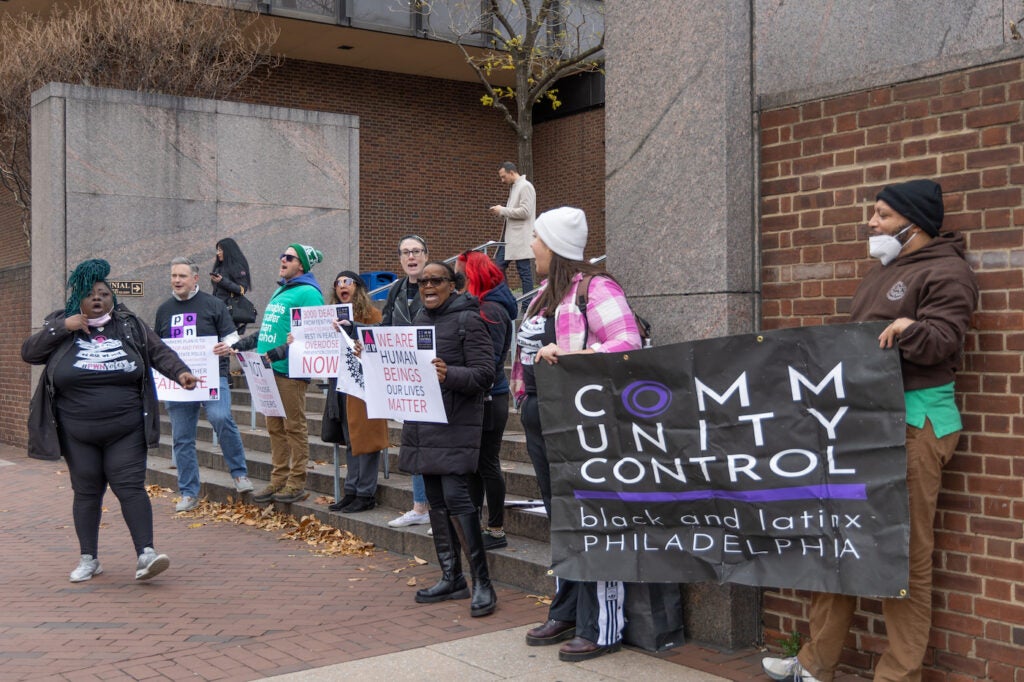
Supervised consumption sites remain largely controversial in the United States, despite research that shows they are effective in other countries.
They’re also considered illegal under the so-called “crack house statute” of the federal Controlled Substances Act, which makes it a crime for anyone to open or maintain a place for the purpose of manufacturing, distributing, or using drugs.
There have been exceptions made to the federal statute, for research purposes, but U.S. attorneys Erin E. Lindgren and Bryan C. Hughes said Safehouse’s intentions for its facility do not qualify for the same treatment under the law.
The DOJ’s legal team also rejected Safehouse’s claim that enforcement of federal drug laws has significantly prevented the nonprofit’s board members from exercising their religious beliefs.
Because Safehouse is not registered as a religious organization, but rather a public charity nonprofit, Lindgren questioned its religious founding and intentions, and said protections under the Religious Freedom Restoration Act of 1993 should not apply.
RFRA is, broadly, a federal law that “ensures that interests in religious freedom are protected.” It has been used in arguments in high-profile lawsuits like the 2014 Supreme Court case, Burwell v. Hobby Lobby Stores Inc.
Lindgren argued that Safehouse leaders have other opportunities to exercise their religious beliefs of caring for people who use drugs by providing them with wound care, clean syringes, social services, and other types of support. Therefore, the federal government has the authority and a duty to reject the supervised consumption component.
However, Eisenstein said the ultimate goal of saving lives — the driving factor in board members’ religious motivations to open a site — cannot be achieved without supervised consumption, because the exact moment when someone takes a substance is when they are most at risk of dying.
Eisenstein said the DOJ’s interpretation of RFRA in this case is both “inconsistent with the law and inconsistent with the way we pleaded the case.”
“They’ve ignored the sincere religious motivation of Safehouse that underlies our desire to provide overdose consumption services to those at risk of overdose death,” she said.
Einstein also claimed that the federal government was being discriminatory in its selective enforcement of the Controlled Substances Act as it applies to supervised consumption sites, as these sites have been operating in New York City since 2021.
“The fact that the government not only has not taken action against those sites, but has never taken action to enforce this law in any context where it’s just pure use inside of a facility, is evidence that this is specifically targeted at Safehouse,” she said. “And we are the one entity that’s asserted, so far, a religious motivation for our proposed activities.”
U.S. District Court Judge Gerald Austin McHugh questioned both parties during their oral arguments Monday. If he denies the DOJ’s dismissal request, the case will continue to the discovery phase. If he grants dismissal, Eisenstein said Safehouse will appeal.
“This is really about establishing the legal authority to open up sites,” said Ronda Goldfein, Safehouse attorney and board member. “This is for those who are suffering in Philadelphia and those who are suffering across the nation. We have a life-saving initiative, we think we should be able to implement it. We believe it’s consistent with the law.”
Legal experts say the next developments in the case are likely headed into the new year, which will coincide with the inauguration of a new Philadelphia mayor.
While outgoing Mayor Jim Kenney has expressed support for supervised consumption sites under federal approval, Mayor-elect Cherelle Parker has maintained opposition to such facilities in the city.
Parker applauded City Council’s passage of a zoning overlay in September that effectively bans any future supervised consumption sites from opening and operating in nine of the city’s 10 council districts.
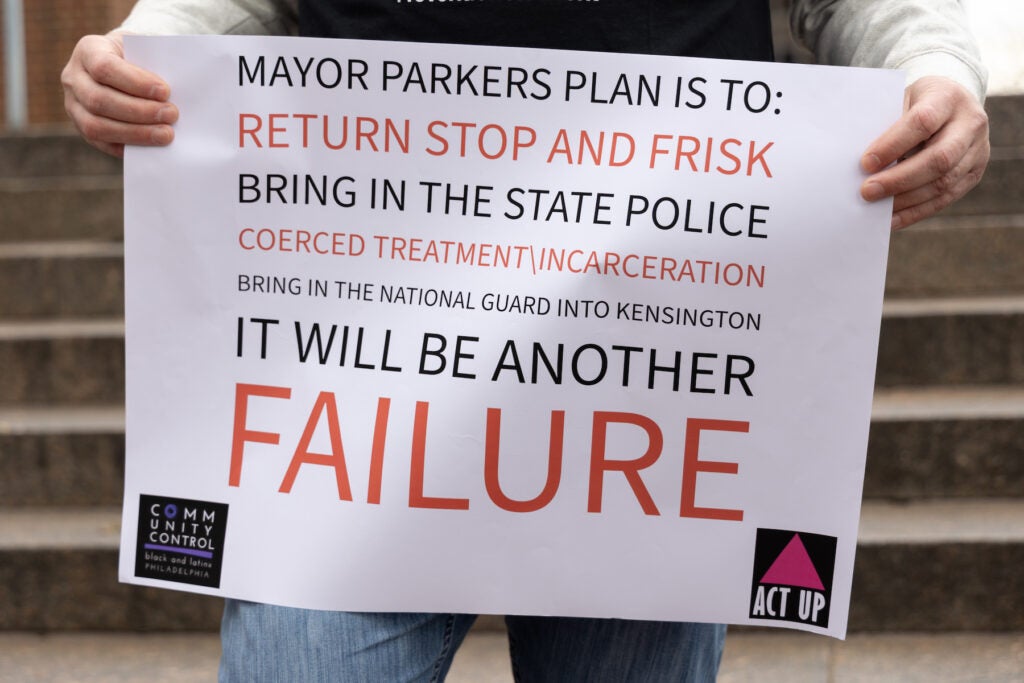
A record 1,413 people in Philadelphia died from drug overdoses in 2022, according to city data. Deaths among Black people jumped 20% from the year before.
Despite legal setbacks in a years-long effort by Safehouse and others to open a site in Philadelphia, harm reduction workers and activists like Sterling Johnson said they remain dedicated to preventing deaths.
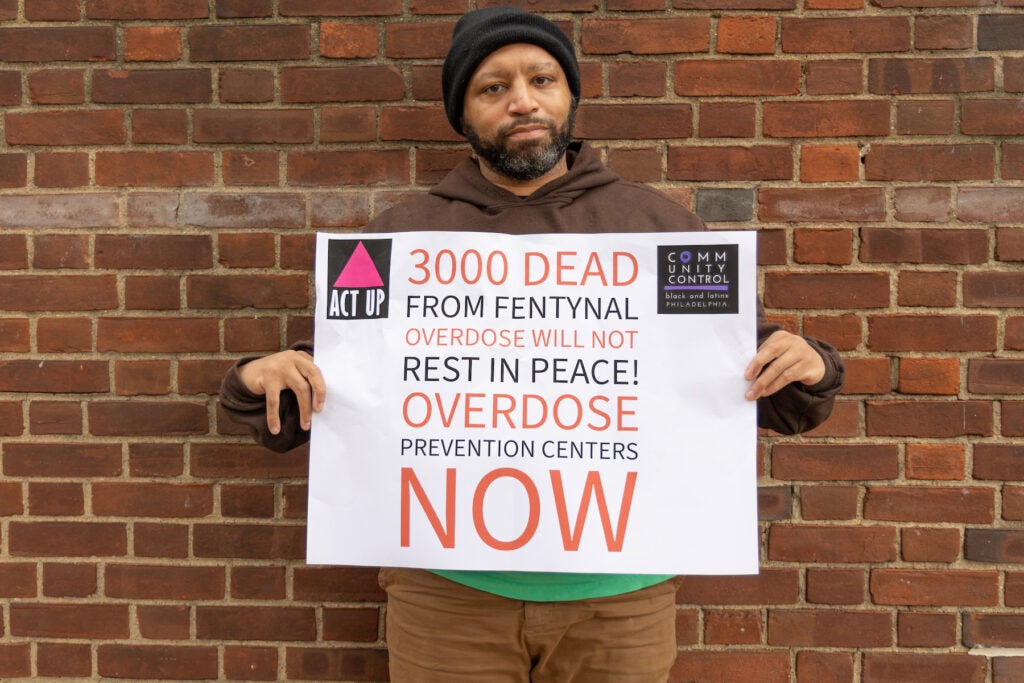
“There’s going to be treatment that works for people, there’s going to be a certain amount of harm reduction for people, there’s also people who are really struggling and actually need a safe place to use,” said Johnson, a member of Black and Latinx Community Control Philadelphia.
A small group of supporters of supervised consumption sites gathered outside the federal courthouse Monday afternoon as they held up signs and banners calling attention to the death toll of the opioid epidemic.

Get daily updates from WHYY News!
WHYY is your source for fact-based, in-depth journalism and information. As a nonprofit organization, we rely on financial support from readers like you. Please give today.


